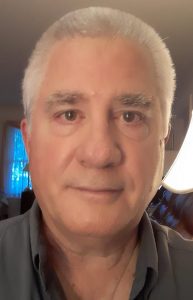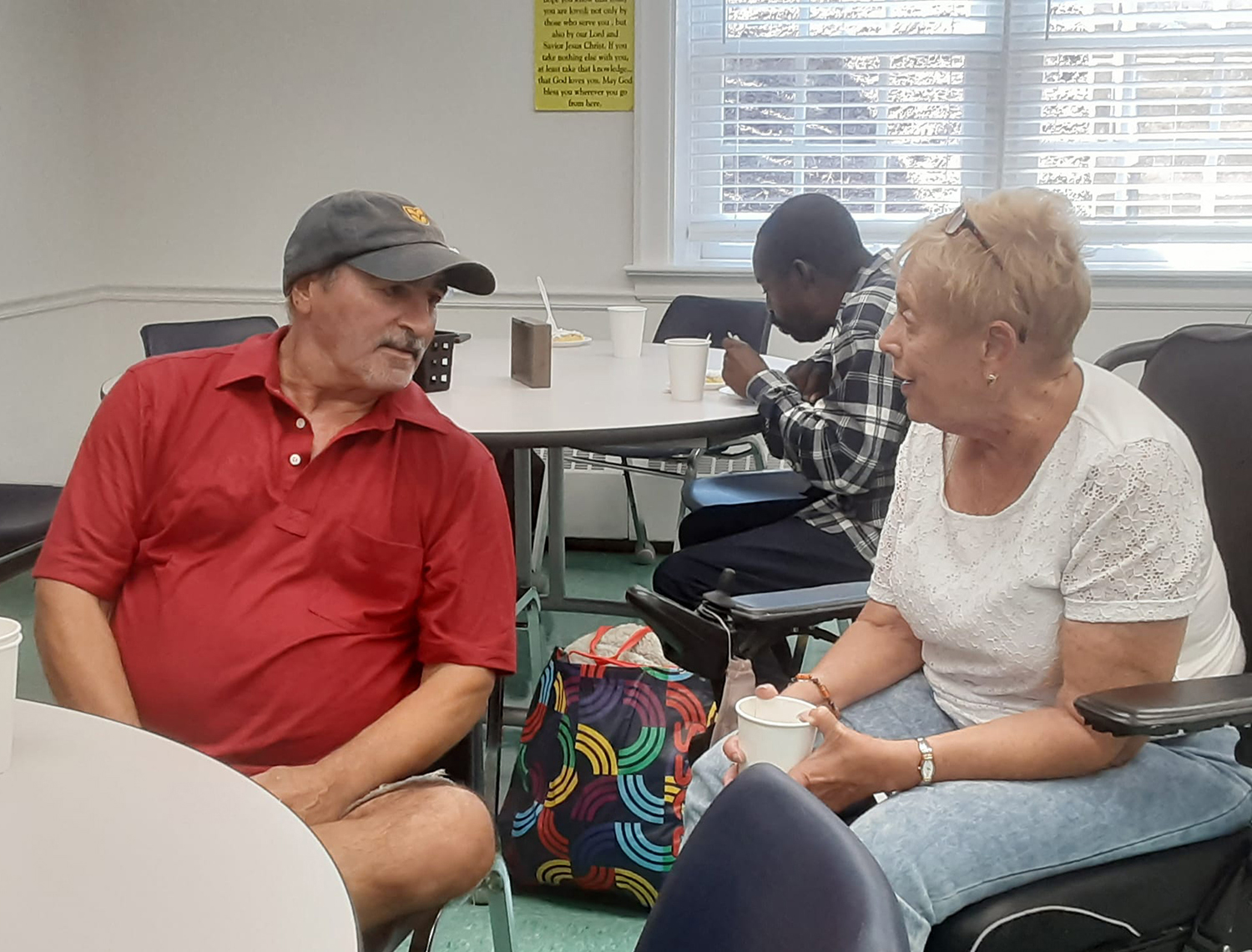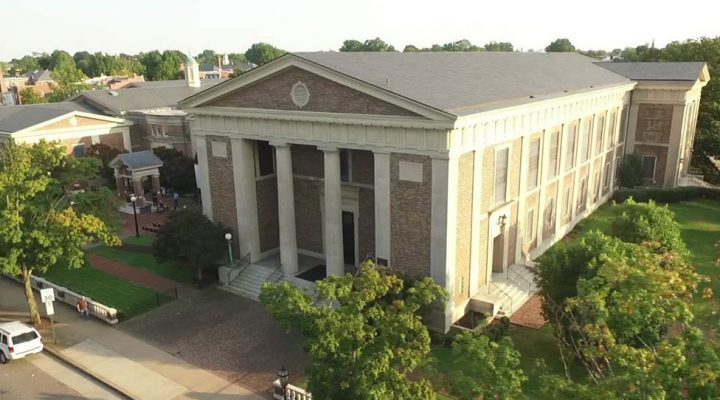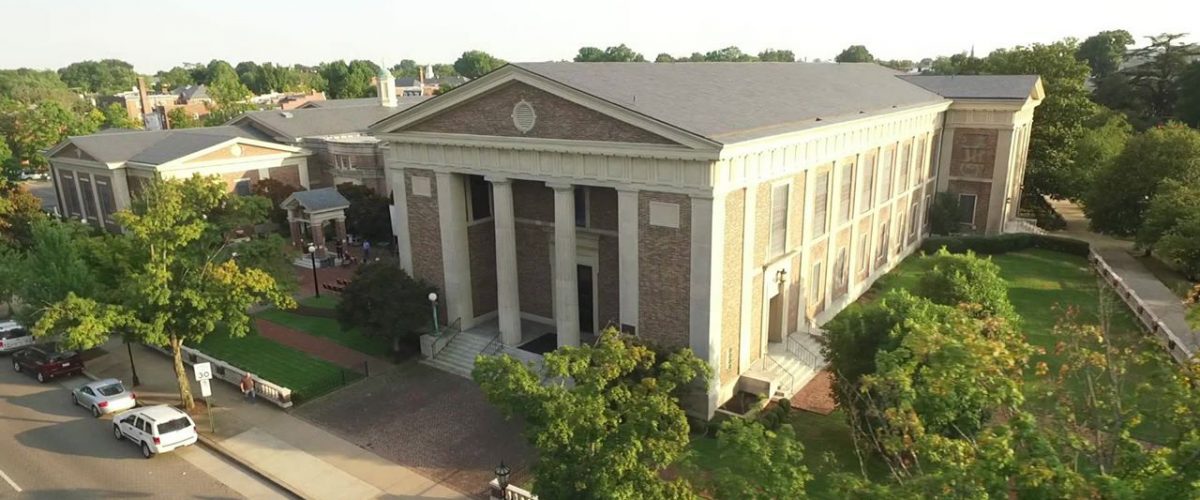The Jesus Room lies in the bowels of Richmond’s cavernous First Baptist Church, one of those stately old churches that takes up most of a city block.
It’s a part of the basement floor of the church, comprising a community area with some round tables and plastic chairs, a back room with racks of donated clothes and shelves of groceries, and some men’s and women’s shower rooms down a short hallway.
I call it the Jesus Room because it’s where I see Jesus on Mondays, Thursdays and Saturdays as a volunteer in the church’s ministry to homeless people.

Erich Bridges
Men and women (and sometimes children) line up on a steep concrete staircase leading down to the basement door. At 11 a.m. sharp, we open the door, and they crowd in to get a cup of coffee or tea, 10 items of canned and packaged food, clothes and showers. They also can drop off dirty laundry for washing and pick up clean clothes, charge their phones, get help obtaining a government I.D. and pick up their mail if they’re using First Baptist as their permanent address.
Sometimes we have hot food brought by volunteers or leftovers from church lunches and dinners upstairs.
Beyond that, people tired from walking the streets all day and sleeping in tents or under bridges at night can sit for three hours in an airy room, trade stories with volunteers and other clients, talk to the voices in their head, doze, use clean toilets and take a shower.
Where is Jesus, you ask? He is in the face of every person who walks through that back door.
I subscribe to Mother Teresa’s literal interpretation of Matthew 25:31-46, the passage where Jesus says, “You did it to me” (or didn’t) if you serve the poor, the hungry, the thirsty, the naked, the stranger, the prisoner. Teresa believed Jesus wasn’t speaking metaphorically but was saying he would come to us personally, daily, in the “distressing disguise” of the hungry, the sick, the inmate, the refugee, the one with no home.
“We see — and smell — some distressing disguises in the Jesus Room.”
We see — and smell — some distressing disguises in the Jesus Room.
Only a few other places in town offer free showers, so some folks come in pretty ripe. Others are angry, sick, exhausted. But many of our clients are quite cheerful and friendly, considering what they go through each day. Almost everyone says “thank you” for a bag of groceries or a few shirts and a pair of pants.
Not everyone. Almost everyone.
Just the other day a new guy came in mad as hell. He’d been disrespected out on the street, shoved around, stolen from — at least the way he told it — and he wanted to take it out on us in loud and profane terms. We usually don’t take much abuse; some former regulars have been banned from the premises for threatening volunteers or other clients. But this guy was having a really bad day and needed to vent.
“He dug into a big plate of taco salad, talked with other clients for a while and apologized for his earlier histrionics as he left.”
So we listened. Then one of our volunteers gently steered him into the clothes closet to check out some fresh duds. Then he disappeared into the showers for about half an hour. When he emerged, I hardly recognized him. The street grime and rage were gone, at least for an hour or two. He had a beatific smile on his face; it stayed there the rest of the time he was with us. He dug into a big plate of taco salad, talked with other clients for a while and apologized for his earlier histrionics as he left.
The same day, a young man staggered in looking close to dead. He had come straight from a local hospital emergency room, where he had been narcanned twice (injected with meds to counteract a potentially deadly opioid overdose) and released onto the street — on one of the hottest days of the summer.

Lisa, a volunteer in the ministry to the homeless at Richmond’s First Baptist, listens to Joe, a visitor to the food pantry and clothes closet. A former parole officer and survivor of homelessness herself, Lisa knows how to listen. Sometimes it’s the most important thing to do.
Lisa, our most savvy volunteer, who steers between tables in her turbo-charged wheelchair, immediately took him under her wing, hydrating him and making sure he didn’t lose consciousness. We made him a pallet in a side hallway so he could rest a while. Eventually he ate a meal and took a shower. He still looked a bit shaky when he left, but at least he would survive the day, we hoped.
I’m just a rookie in the Jesus Room, which has been welcoming homeless people for many years. Lisa, a former parole officer, 10 years sober, a survivor of homelessness herself, knows how to listen. Really listen. I love watching her bending forward in her wheelchair, head almost touching the head of whoever she’s listening to. They listen to her, too.
Steve Blanchard, minister of compassion, and his staff colleagues Michael Lacy and Emma Tilley are our fearless leaders. Sandra, Emily and Betty run the clothes closet. John and Dwight fill grocery bags with lightning speed. Dianne holds down the laundry table. KK and Chuck handle the shower operation. Michael, Bob and I man the front table and steer people where they need to go. Other volunteers help as they can.
“It’s barely a drop in the ocean of need. But it’s a drop.”
We know it’s a Band-Aid ministry. It’s barely a drop in the ocean of need. But it’s a drop. These people need much more than we can give. Until they get it, we can offer a smile, a joke, a prayer, maybe the latest sports news. One of our regulars is an expert on classic movies and challenges us to pick one over another and defend our choices. We better come prepared.
“We make people feel human,” Steve says.
In his new book, Rough Sleepers, Pulitzer Prize-winning author Tracy Kidder profiles the career of physician Jim O’Connell, who has spent decades caring for the wounded bodies and hearts of Boston’s homeless population. Early on, O’Connell learned the ropes from veteran nurses who had long tended street people — especially Barbara McInnis, a lay Franciscan. She made him take off his stethoscope until he had spent more than a month soaking the sore, broken feet of the people they served. It wasn’t about medicine, she explained.
“If you come in with your doctor questions, you won’t learn anything,” she told him. “You have to learn to listen to these patients.”
Pretty good advice. Heed it, and you might even hear from Jesus.
Erich Bridges, a Baptist journalist for more than 40 years, retired in 2016 as global correspondent for the Southern Baptist Convention’s International Mission Board. He lives in Richmond, Va.


